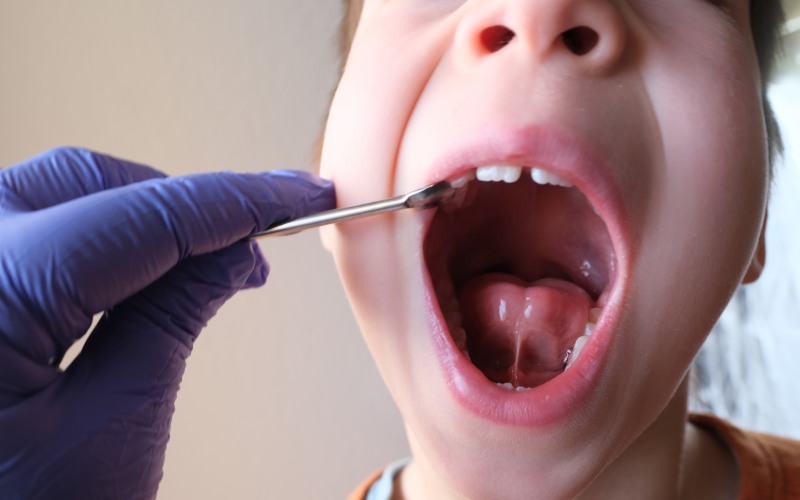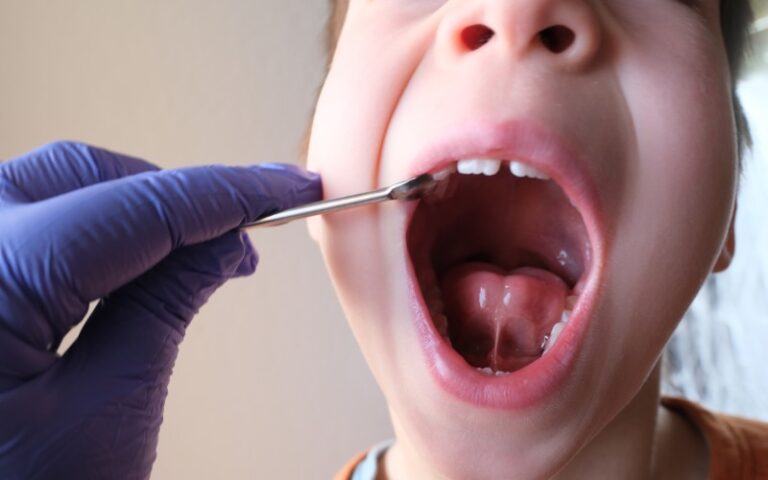Tongue tie, medically known as ankyloglossia, is a condition where the thin piece of tissue, or lingual frenulum, which connects the bottom of the tongue to the floor of the mouth is shorter than usual, restricting the tongue’s movement.
Experts disagree on whether, or how much, that tongue tie affects speech. However, according to the Mayo Clinic, a reliable source, there are several symptoms and concerns associated with tongue tie, including difficulty lifting the tongue to the roof of the mouth, challenges moving the tongue side to side, trouble extending the tongue past the lower lip, and a tongue that appears notched or heart-shaped when protruded, and the potential to struggle with certain speech sounds.
Table of Contents
ToggleSeverity of Tongue-Tie
Tongue-tie may occur at different points along the lingual frenulum, ranging from near the tip of the tongue to further back towards the base. The severity depends on how tightly the frenulum restricts tongue movement. Mild cases may only slightly impede mobility, while severe cases significantly limit the tongue’s range of motion. The location and severity of the tie influence the degree of difficulty experienced when breastfeeding, speaking, or maintaining oral hygiene.
Impacts on Speech
The more severe the condition, the more likely it is to affect speech, as well as other oral functions.
Tongue-tie can affect speech by restricting the movement of the tongue, impeding its ability to articulate certain sounds properly. This restricted tongue movement due to the shortened or tighter lingual frenulum can lead to difficulties in forming sounds correctly, resulting in speech that is unclear or difficult to understand.
Certain sounds are particularly affected potentially by having the tongue’s range of motion reduced. Speech sounds that require certain tongue movements, such as “l,” “r,” “s,” and “th,” may be particularly challenging to produce.
Sounds like “l” and “r” require the tongue to lift and touch specific areas of the mouth. The limited tongue movement caused by tongue-tie makes it challenging to position the tongue correctly for these sounds, resulting in unclear pronunciation. On the other hand, sounds like “s” and “th” involve the tongue moving against the teeth or roof of the mouth. With tongue-tie, the tongue may struggle to reach these positions, leading to difficulty producing these sounds accurately. This can lead to lisping or other speech concerns.
Individuals with tongue-tie may compensate by altering their speech patterns or substituting approximate sounds. Again, the severity of the tongue tie will affect how impacted an individual may be.
Treatment
Treatment options for tongue-tie depend on the severity of the condition and the individual’s symptoms. In cases where tongue-tie causes significant difficulties, surgical intervention may be recommended. This procedure, known as a frenotomy or frenectomy, involves cutting the frenulum to release the restriction on tongue movement. It is a relatively simple and quick procedure that can often be performed in a dentist’s office.
However, not all cases of tongue tie require intervention. In mild cases where symptoms are minimal, conservative treatments, such as speech therapy exercises or techniques to improve tongue mobility, may be sufficient.

Diagnosis
Diagnosis of tongue-tie can occur at different stages of life. In infants, it may be identified shortly after birth when breastfeeding difficulties arise, such as difficulty latching, before any speech concerns would be noted. In older children or adults, symptoms such as speech impediments or difficulty with certain oral tasks may prompt evaluation for tongue tie.
A healthcare professional, such as a pediatrician, dentist, or speech therapist can diagnose a tongue tie and can give you a better idea of how much the tie may be impacting you or your child.
Different symptoms may become evident as people age. While infants may exhibit difficulty with tongue movement, as they grow up speech impediments or other symptoms may start to arise. As a result, tongue-tie may be noticed and diagnosed at different stages of life. Individuals or parents of children with suspected tongue-tie should consult with a trusted healthcare professional for diagnosis and to recommend a treatment plan; you shouldn’t assume that tongue-tie would have been diagnosed in infancy. However, health professionals may often identify a tongue-tie concern, including during infancy and before issues may have been noticed.
Dentists are well-positioned to diagnose and treat tongue-tie, as they are knowledgeable about oral anatomy and function. Additionally, they regularly see your mouth through regular checkups. These routine examinations mean they will spot a tongue-tie for you or your children, and assess whether there may be signs of significantly restricted tongue movement. They can guide you on the potential impact of tongue tie on oral health and speech articulation, and recommend appropriate interventions such as speech therapy or frenectomy, if necessary, to address the condition effectively.
If you have concerns or questions about tongue-tie, the Century Stone Dental team can help you. We can assess your situation and recommend treatment; we’ll always take time to answer all of your questions.
No matter your age, dental condition, and if you have a million questions, Dr. Sims can assist you or your young children in a professional manner and loves answering any of your questions or concerns. Dr. Sims grew up in Grimsby playing basketball, so he’s always up for talking about the Raptors! He’s also a football fan - go Buffalo Bills! In his free time, if he’s not watching a basketball game or football game, you’ll likely find him working out, cooking (got any new recipe ideas?), and of course, spending time with his amazing family.
- Does Tongue Tie Affect Speech? - April 26, 2024
- Tongue Tie Surgery: Medical or Dental? Your Complete Guide - February 28, 2024
- What to Eat After Tooth Extraction - January 16, 2024











